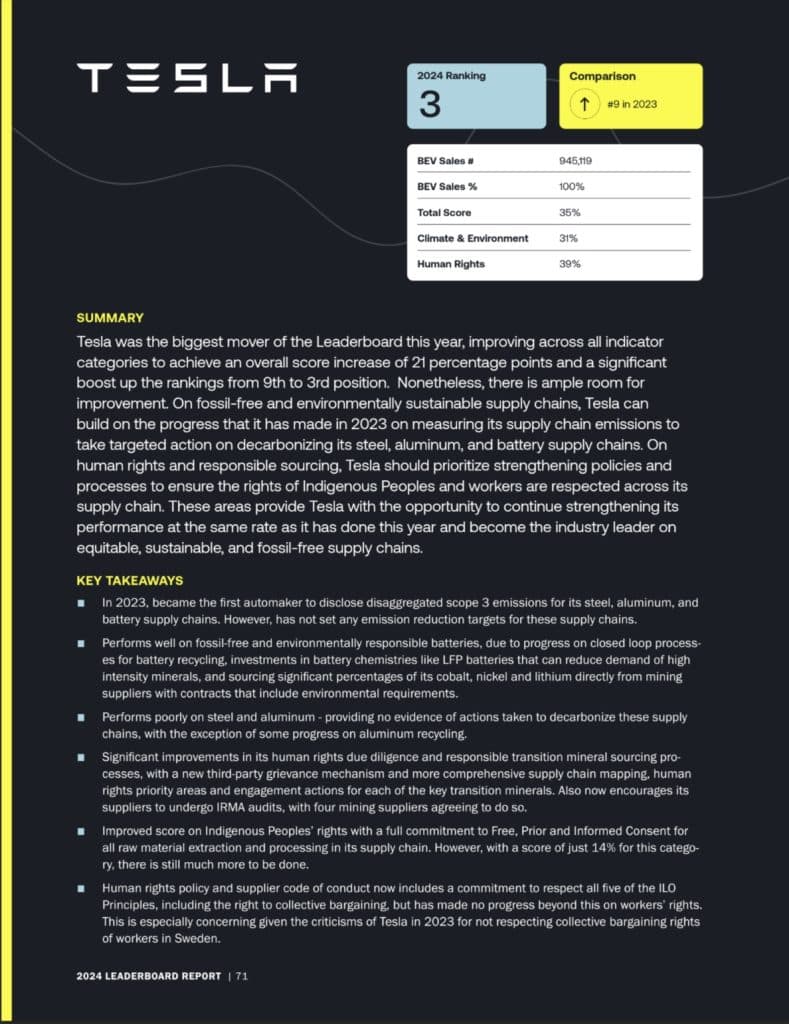- 🌱 Tesla has significantly improved its supply chain sustainability and human rights practices, according to a study by environmental group Lead the Charge.
- 🔝 Tesla jumped from ninth to third place in Lead the Charge’s annual Auto Supply Chain Leaderboard and Report.
- 📊 Lead the Charge’s study analyzes data from 18 automotive manufacturers, ranking their efforts to eliminate emissions, environmental harms, and human rights violations from their supply chains.
- 🏆 Tesla achieved the largest score increase among its peers in the study, improving across all eight indicator categories.
- 🔄 Tesla notably disclosed disaggregated supply chain emissions by steel, aluminum, and battery production, a significant shift from the previous year.
- 🌍 Tesla’s improvements demonstrate potential for other automakers to achieve similar progress with dedicated effort, particularly in fossil-free and environmentally sustainable supply chains.
- 🛑 Tesla revised its requirements on Indigenous Peoples’ right to Free, Prior and Informed Consent (FPIC) in its responsible sourcing policy, though specific disclosures on identified risks to Indigenous Peoples’ rights are deemed insufficient.
In today’s fast-paced world, sustainability isn’t just a buzzword; it’s a necessity. From renewable energy to eco-friendly transportation, companies across industries are being called upon to prioritize environmental and social responsibility. One such company leading the charge is Tesla, the electric vehicle giant known for its innovative technology and commitment to sustainability.

Tesla’s Leap in Supply Chain Sustainability
Recent findings from a study conducted by environmental group Lead the Charge reveal the remarkable strides Tesla has made in enhancing its supply chain sustainability and human rights practices. According to the study, Tesla catapulted from ninth place to a commendable third place in Lead the Charge’s annual Auto Supply Chain Leaderboard and Report.
Analyzing Lead the Charge’s Study
Lead the Charge’s comprehensive study delves into the supply chain practices of 18 automotive manufacturers, scrutinizing their efforts to eradicate emissions, environmental harm, and human rights violations. Tesla’s remarkable ascent in the rankings underscores its dedication to fostering a cleaner, more ethical supply chain.
Key Takeaways from the Study
- Tesla’s Unprecedented Improvement: Among its peers, Tesla stands out for achieving the largest score increase across all eight indicator categories evaluated in the study.
- Transparent Emissions Disclosure: Notably, Tesla has embraced transparency by disclosing disaggregated supply chain emissions related to steel, aluminum, and battery production, a notable departure from previous practices.
- Potential for Industry-wide Impact: Tesla’s success serves as a beacon of hope, demonstrating what automakers can achieve with concerted effort towards sustainability and responsible sourcing.

Room for Growth
While Tesla’s advancements are commendable, there remains room for improvement, particularly in addressing identified risks to Indigenous Peoples’ rights. Though the company has revised its policies on Free, Prior and Informed Consent (FPIC), more robust disclosures are necessary to ensure full transparency and accountability.
The Path Forward
Tesla’s journey towards supply chain sustainability serves as a model for the automotive industry and beyond. As consumers increasingly demand ethically sourced products, companies must prioritize sustainability initiatives to remain competitive and contribute to a healthier planet.
Conclusion
Tesla’s remarkable ascent in Lead the Charge’s Auto Supply Chain Leaderboard underscores its unwavering commitment to sustainability and ethical practices. By embracing transparency, innovation, and corporate responsibility, Tesla is not only driving towards a greener future but inspiring positive change across industries.





